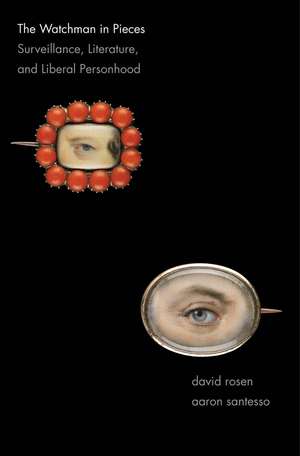The Watchman in Pieces: Surveillance, Literature, and Liberal Personhood
Autor David Rosen, Aaron Santessoen Limba Engleză Hardback – 16 iul 2013
Spanning nearly 500 years of cultural and social history, this book examines the ways that literature and surveillance have developed together, as kindred modern practices. As ideas about personhood—what constitutes a self—have changed over time, so too have ideas about how to represent, shape, or invade the self. The authors show that, since the Renaissance, changes in observation strategies have driven innovations in literature; literature, in turn, has provided a laboratory and forum for the way we think about surveillance and privacy. Ultimately, they contend that the habits of mind cultivated by literature make rational and self-aware participation in contemporary surveillance environments possible. In a society increasingly dominated by interlocking surveillance systems, these habits of mind are consequently necessary for fully realized liberal citizenship.
Preț: 443.39 lei
Preț vechi: 575.84 lei
-23% Nou
Puncte Express: 665
Preț estimativ în valută:
84.85€ • 86.90$ • 70.58£
84.85€ • 86.90$ • 70.58£
Carte tipărită la comandă
Livrare economică 18 martie-01 aprilie
Preluare comenzi: 021 569.72.76
Specificații
ISBN-13: 9780300155419
ISBN-10: 0300155417
Pagini: 376
Ilustrații: 10 b-w illus.
Dimensiuni: 156 x 235 x 25 mm
Greutate: 0.75 kg
Ediția:New.
Editura: Yale University Press
Colecția Yale University Press
ISBN-10: 0300155417
Pagini: 376
Ilustrații: 10 b-w illus.
Dimensiuni: 156 x 235 x 25 mm
Greutate: 0.75 kg
Ediția:New.
Editura: Yale University Press
Colecția Yale University Press
Notă biografică
David Rosen is associate professor of English at Trinity College, and Aaron Santesso is associate professor of Literature at Georgia Tech.
Recenzii
“An ambitious, illuminating, and convincing book. I have rarely been so excited and enlightened by the argument of a literary study as I was by this.”—Edward Mendelson, Columbia University
"The Watchman in Pieces is an erudite, major addition to surveillance studies. Like Weber, Habermas, and Foucault, though with many differences, the authors are 'rethinking the history of modernity.'"—Patrick Brantlinger, Indiana University
Winner of the 45th annual James Russell Lowell Prize sponsored by the Modern Language Association.
